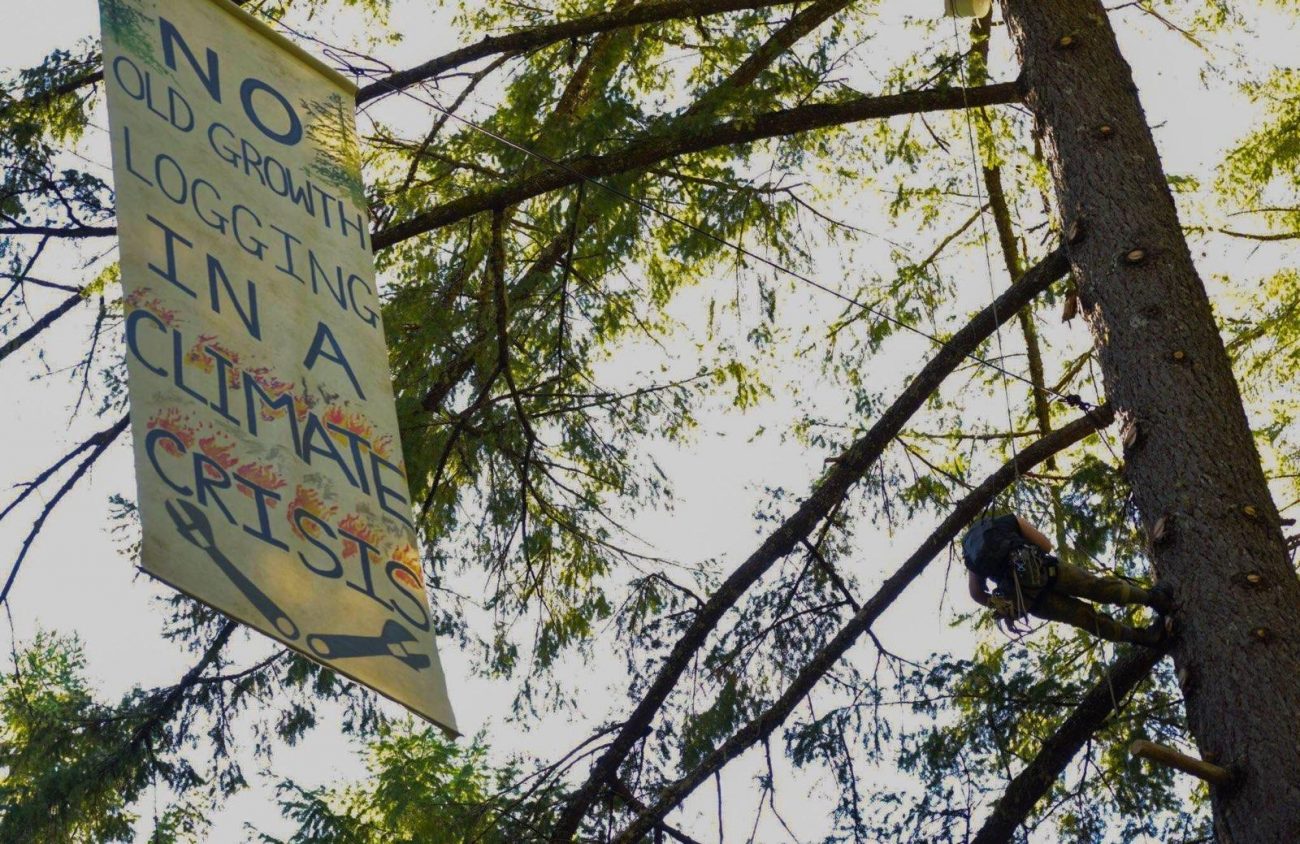The afternoon sun streams through the trees as several people with Cascadia Forest Defenders sit on wooden platforms, placed parallel in trees high above the forest floor in the Willamette National Forest. Old growth Douglas fir and Western red cedars surround them in all directions.
In between the two platforms, a large sign hangs down from a wire stretched across two trees reading, “No old growth logging in a climate crisis.”
These advocates participating in the tree sit are protesting the U.S. Forest Service’s Flat Country Project, a timber sale that encompasses a 74,091-acre section of old growth forest east of Highway 126, eight miles east of McKenzie Bridge. The current plan moving forward will allow “harvest,” aka cutting down trees, on 4,438 acres in the project area. Activists say logging the area will have an adverse environmental impact that will ripple through local ecosystems and communities along the McKenzie River.
In an email to Eugene Weekly, the USFS wrote that they had no comment on the tree sit.
While the world battles climate change, activists say it is crucial to protect these carbon-rich forests.
“The health of our community is tied directly to the health of our forests. The water we drink and the air we breathe are dependent on protecting what’s left of our native forests from industrial logging,” says Daniel, an organizer with Cascadia Forest Defenders. The tree sitters are using aliases due to the possibility of arrest.
The sale also includes 1,000 acres of “regeneration harvest” — which many advocates say is another way to say “clearcut” — as well as thinning of trees across the land. The final record of decision for the sale was released in January 2021, according to documents, and the USFS will soon begin auctioning off the units of land.
Organizers are also calling on federal and local officials to take action against this sale and old growth logging in general, as these forests are carbon rich. This spot of land also borders the Mount Washington Wilderness.
The tree sitting crew describes themselves as a “rotating cast of characters.” People come and support when they can and take turns sitting up in the trees or monitoring the situation on the ground. They say they want the timber companies involved in the sale to know if they buy the sale, they buy the people sitting in the trees as well.
“One of the really critical messages that we’re trying to get out there is that industrial scale logging of mature and older forests is still happening,” says Wren, an organizer. “And that’s happening in the middle of a climate crisis where communities are experiencing unprecedented weather events, wildfires and threats to our very existence.”
The sale was first proposed back in 2018, and since then, various environmental advocacy groups, such as Cascadia Wildlands, and politicians have spoken out against it. Congressman Peter DeFazio wrote a letter to USFS Chief Vicki Christiansen in May 2021, admonishing the Forest Service for trying to move forward with the sale. Prominent forest ecologists Jerry Franklin and Norm Johnson have spoken out, too.
Meanwhile, forest advocates visited the area frequently, Wren says, admiring the beauty of the large trees and nearby streams. Another activist, Keyboard, says the other day they came across a tree with a diameter of 95 inches. Many of these trees are almost 200 years old.
Another important aspect of this land, Wren says, is it contains two important tributaries that flow into the McKenzie River — the river that provides life for the diverse ecosystems around it as well as drinking water for hundreds of thousands of people.
Standing over a small ridge, Wren points out Olallie Creek, gushing out of the ground like a waterfall into the creek bed below.
“You can drink this water straight from the stream,” he says. Wren explains that if the sale goes through, the forest surrounding the tributary can be harvested, although the timber companies are required to leave a buffer of trees around the stream.
Another advocate in the tree sit, who uses the name Bramble, says there aren’t many areas of old growth like this left, and with climate change, the forests may never come back at all in the same way. Springs don’t have to flow, Bramble says, they can dry out.
For now, the tree sitters will continue to protest the sale, hoping that more politicians and powerful players will speak up against the harvesting of old growth forests.
“I think we will be out here until the timber industry and in turn, the Forest Service knows that whoever buys the sale is buying our resistance for the foreseeable future because there is no way that our community is going to let these forests be clearcut,” Wren says.
This story has been updated.
